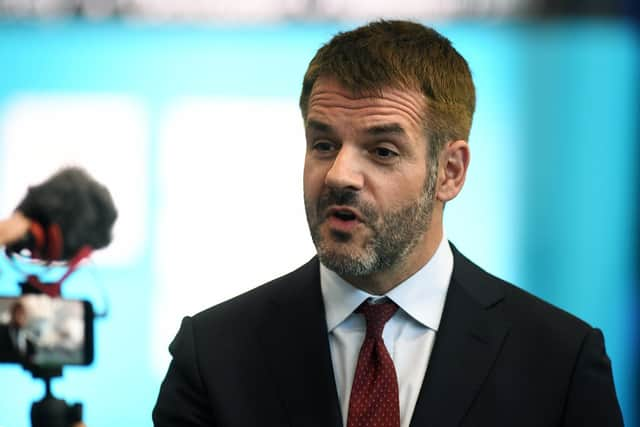Why week has been one of joy and grief in both football and politics - David Blunkett
So, let me plead guilty to being just one of those people. My excuse is that I was inflicted with both obsessions at a very early age. In the case of football, when my dad took me to Hillsborough and sat me on the wall behind the goal at the age of four.
In terms of my inescapable commitment in the political arena, it was in my early teens when, unaware of what was to come, I became obsessed with current affairs and the desire to “make a difference to the world”.
Advertisement
Hide AdAdvertisement
Hide AdThis month, both these all-consuming passions coalesced within a matter of days. On the football front, Sheffield Wednesday made it into the play-offs, but sadly not to Wembley; our arch-rivals, Sheffield United, remain in the play-offs for the Premier League. For the sake of Sheffield and Yorkshire as a whole, I have to begrudgingly wish United well.


In Yorkshire, Rotherham had already been promoted from League One but, sadly, Doncaster and Barnsley had dropped to League Two and League One respectively. As I write, Leeds struggle to remain in the Premiership, which means that Yorkshire could end up with no Premier League football team, unless Sheffield United or Huddersfield beat their opponents.
Forgive me for spelling all this out. It is, however, crucial to the prestige and standing of God’s own county that we have some success in football, because it really does make a difference to the way the world sees us. There is nothing like global coverage of a football match to bring the kind of publicity that no local authority, or elected mayor, could manage.
Which brings us to politics. With two seats changing hands in Hull, the Liberal Democrats take over from Labour. The newly elected Metro Mayor for Sheffield and South Yorkshire, Oliver Coppard, takes over from Dan Jarvis, who, having managed the daunting task of getting local politicians to work together in the interests of their area, decided to stand down and concentrate on his role as an MP. Just as in football, so in politics, winners and losers carry the consequences.
Advertisement
Hide AdAdvertisement
Hide AdAcross the UK, the Conservatives lost nearly 500 seats and a number of councils, including, significantly, their flagship local authorities of Westminster, Wandsworth and Barnet.
However, a hard-headed and rational appraisal demonstrates that Labour still has a long way to go.
Yes, the situation is vastly better than it was two years ago. Then, it was hard to get a welcome in a neighbourhood; now you’re at least welcomed in the street, if not exactly in the home for a cup of tea.
What struck me most about the results announced on May 6 was a failure to properly analyse what made the difference to the outcomes from different parts of the country; and how local issues counterweigh the undoubted propensity of people to vote in terms of how they perceive the Government and the Prime Minister.
Advertisement
Hide AdAdvertisement
Hide AdIt is evident that outside London, particularly in the North of England, the memory of Jeremy Corbyn’s leadership of the Labour Party has not yet faded. But as a lifelong Labour activist I must ask myself the question: “What motivates 30 per cent of those who voted in the local elections to place their cross for the Conservatives?”
Understand that conundrum and you begin to understand the psychology of the even larger percentage of Conservative supporters predicted to vote in the next general election.
The Conservatives have one overriding asset on their side.
After Brexit, the absorption of what had been UKIP into the ranks and policies of the Conservative Party ensured that whatever factions and internal contradictions exist, they do so within the Conservative fold. Then look at the centre and left of British politics, and the fracturing of the vote between Labour, Liberal Democrats, and the Greens (and the complications of SNP dominance in Scotland).
I have always been against proportional representation because I believe in the single-member constituency, and the crucial link this brings between the electorate and those representing them in Parliament.
Advertisement
Hide AdAdvertisement
Hide AdI’m now convinced that we must have some informal understanding between those who consider themselves progressives if there is to be any chance of overturning the Conservative party, which has led the Government for 12 years.
Every party that aspires to be in government is therefore aspirant to receive support from across the nation. But relying purely on the good instincts of voters to work out who might just have a chance of success – when each political party, often erroneously, claims that it will be “them” – is the nth futility.
So, the lessons of May 2022 are very simple. If you want the highs and lows of joy and disappointment, of adrenaline and deep depression, then, like me, follow a football club and join a political party.
Lord Blunkett is a Labour peer and former Home Secretary.
